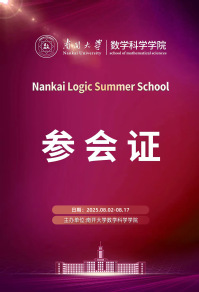暑期学校上课时间
lecture1:8:30 am - 10:00 am(GMT+8)
lecture2:10:30 am - 12:00 pm(GMT+8)
seminar:14:00 pm - 16:00 pm(GMT+8)
上课地点:数学科学学院 2楼 第一报告厅
本次暑期学校为线下,不设线上直播。暑期学校课程有录像,计划每日更新。
南开逻辑投稿视频-南开逻辑视频分享-哔哩哔哩视频 (bilibili.com)
按目前管理规定,各位可以凭以下图片进出校园。

学校食堂支持微信支付和支付宝支付。开放食堂:学一食堂、学二食堂二楼、清真食堂、实习餐厅。
很遗憾,我们无法为参加暑期学校的非本地同学提供住宿。你需要自行预订学校周边住宿。
2025南开大学数理逻辑暑期学校
Summer School
2025年8月4日-8月15日,南开大学数学科学学院将举办南开大学数理逻辑暑期学校。我们非常荣幸的请到了奥克兰大学的Andre Nies和中国科学院数学与系统科学研究院的Rizos Sklinos。欢迎大家参加。
1.授课教师
Week1:Andre Nies
Andre Nies is a Professor at the School of Computer Science, University of Auckland. His research interests include computability theory, descriptive set theory, and their connections to group theory. He authored the 2009 book “Computability and Randomness”, Oxford University Press.He was a 2010 International Congress of Mathematics invited speaker in the logic session, and received the 2020 Humboldt research award.
Website: https://www.cs.auckland.ac.nz/~nies/
Week2:Rizos Sklinos
Rizos Sklinos is an associate professor in the Chinese Academy of Sciences. His research is focused on geometric group theory and model theory.
2.报名申请
南开大学数理逻辑暑期学校欢迎对数理逻辑有兴趣的本科生、研究生参加。
申请人须在请在6月9日23:59前完成以下报名步骤:
1.在线报名申请(本校学生还要进行选课流程):
https://www.wjx.top/vm/YPF4ikM.aspx# (或点击“阅读原文”)
2.暑校不包食宿。如需申请经济补助(每人税前3000元,资助十人),请在填写好在线报名表的基础上,邀请一名推荐人从推荐人本人邮箱发送推荐信至logic@nankai.edu.cn。推荐人以数理逻辑及相关专业学者为佳。
3.时间地点
4.课程介绍
Computability, randomness, and K-triviality
Andre Nies
The first two to three days of the course introduce computability theory: computably enumerable sets, reducibilities, finite injury priority method and other topics. From there on we proceed to more advanced topics. Randomness of infinite bit sequences can be formalised using tools from computability, leading to thefundamental notion of Martin-Loef randomness. K-trivial bit sequences (where the “K” refers to Kolmogorov complexity) are far from random, and at the same time close to computable. Notions from randomness conversely enrich computability, for instance via an easy priority-free solution to Post’s problem.
The course is targeted at students who have at least taken a first course in mathematical logic, and are familiar with recursive functions and Turing machines.
Gromov's Randomness & Model Theory of Groups
Rizos Sklinos
This mini-course consists of two seemingly distant subjects of Mathematics: Geometric Group theory and Model Theory. Gromov in a seminal work (1987) introduced hyperbolic groups and since then they have been constantly in the center of research attention. In order to promote this newly introduced class of groups Gromov stated that if one picks a finitely presented group at random, then it is almost surely hyperbolic. This intuitive statement has been made precise by introducing various models of randomness. The first goal of this mini-course is to introduce the students to the class of hyperbolic groups and the notion of randomness.
On the other hand, in 1946, Tarski asked whether nonabelian free groups share the same first-order theory. This question proved very hard to answer and only after more than 50 years, in 2001, it was answered positively. In voluminous works Sela and Kharlampovich-Myasnikov independently gave proofs that until now have not been completely absorbed. The second part of this mini-course will introduce the students to these techniques and give detailed proofs of the most interesting results we now know about this interesting first-order theory.
In the last part of the mini-course, we will bring, maybe surprisingly,the two threads together. The motivating question is: if we pick a finitely presented group at random, what first-order properties does it have?
Finally, this mini-course is intended for graduate and final year undergraduate students. I will assume a solid background in first-order logic. Some background in group theory and model theory will be helpful.
Day 1: Randomness I.
Day 2: Randomness II.
Day 3: Model theory of Free Groups I.
Day 4: Model theory of Free Groups II.
Day 5: First-order sentences in Random groups.
5.课时安排
lecture1:
8:30 am - 10:00 am(GMT+8)
lecture2:
10:30 am - 12:00 pm(GMT+8)
seminar:
14:00 pm - 16:00 pm(GMT+8)

